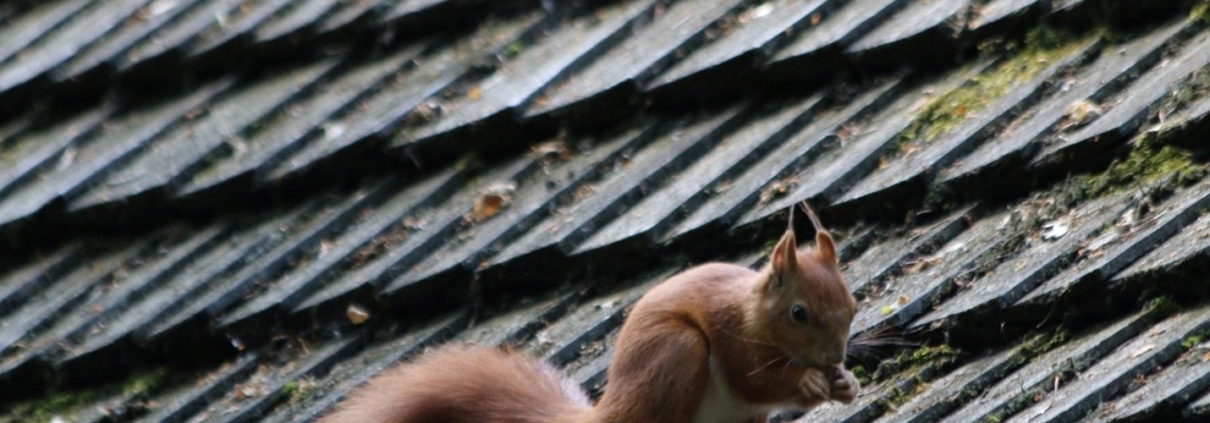Potential Damage Caused by Squirrels
Squirrels may seem like harmless, furry creatures, but when they make their way into your home, they can cause significant damage. While they are often seen scampering through trees, squirrels are notorious for finding their way into attics, crawl spaces, and walls. Once inside, they can create a variety of problems that may lead to costly repairs and safety hazards. At Lincoln Pest Control, we understand the importance of addressing squirrel infestations quickly and effectively before they cause serious harm to your home.
How Squirrels Get Into Your Home
Squirrels are incredibly agile and can easily access roofs, siding, and vents. They often enter homes through:
- Roof Gaps and Vents: Small openings in your roof, soffits, or vents provide easy access for squirrels looking for a place to nest.
- Chimneys: Squirrels can climb down chimneys in search of warmth, which is why chimney caps are essential.
- Weak Spots in Siding: Any weaknesses or holes in your home’s exterior siding can serve as entry points for squirrels.
The Damage Squirrels Can Cause
Once squirrels find their way into your home, they can create a range of problems that go far beyond just being a nuisance. Here’s a look at the potential damage they can cause:
Chewing Through Wires
One of the most dangerous problems caused by squirrels is their tendency to chew on electrical wiring. Squirrels’ teeth grow continuously, so they instinctively gnaw on things to keep them from getting too long. Electrical wires are often one of their targets, which can result in:
- Fire Hazards: Exposed wires can easily spark and lead to electrical fires, putting your entire home and family at risk.
- Power Outages: Damaged wiring may also cause disruptions in your electrical systems, leading to costly repairs and the need for rewiring.
Structural Damage
Squirrels are capable of causing significant structural damage to your home. They can:
- Chew on Wood: Squirrels often gnaw on wooden beams, trusses, and rafters, weakening the structural integrity of your home over time.
- Tear Up Insulation: Squirrels use insulation as nesting material, which can lead to insufficient insulation and increased energy bills.
- Damage to Roofs and Eaves: Squirrels can chew through roof shingles and eaves, creating entry points for water leaks that can lead to mold growth and further damage.
Contamination from Feces and Urine
Squirrels, like any wild animal, leave behind waste in the form of feces and urine. Over time, this can lead to:
- Health Hazards: Squirrel droppings can carry diseases such as leptospirosis and salmonella, posing a health risk to your family.
- Odor Issues: The smell of urine and droppings can permeate your home, creating unpleasant odors that are difficult to eliminate.
- Damage to Drywall and Insulation: Over time, the accumulation of squirrel waste can saturate drywall and insulation, leading to structural damage and the need for replacement.
Nesting and Breeding
Squirrels may use your attic or walls as a safe place to nest and raise their young. This can result in:
- Persistent Infestations: If squirrels breed inside your home, the population can quickly grow, making the infestation harder to control.
- Blocked Vents: Squirrels may build nests in venting systems, causing blockages that can affect airflow, heating, and cooling efficiency.
Signs of a Squirrel Infestation
Identifying a squirrel problem early can help you avoid costly damage. Some common signs of squirrel activity in your home include:
- Scratching Noises: Squirrels are active during the day, so if you hear scratching, scurrying, or gnawing sounds coming from your attic or walls, you likely have squirrels inside.
- Droppings: Squirrel droppings are small, pellet-like, and can be found in attics or near entry points.
- Chewed Wires or Wood: Look for signs of gnawed wood or frayed electrical wires, especially in your attic or basement.
- Entry Points: Check your roof, vents, and eaves for gaps, holes, or other damage that may indicate a squirrel’s entry.
Preventing Squirrel Damage
To protect your home from squirrels, it’s important to take preventative measures, including:
- Sealing Entry Points: Inspect your home for gaps, cracks, or openings in the roof, walls, or foundation, and seal them to prevent squirrels from getting inside.
- Installing Chimney Caps: A chimney cap will prevent squirrels from entering your home through the chimney.
- Trimming Trees: Keep tree branches trimmed away from your roof to make it harder for squirrels to access your home.
How Lincoln Pest Control Can Help
If you suspect a squirrel infestation, it’s essential to take action quickly to avoid further damage. At Lincoln Pest Control, we offer comprehensive squirrel removal and exclusion services to protect your home. Our expert team will:
- Conduct a thorough inspection to identify entry points and assess damage.
- Safely remove squirrels from your home using humane trapping methods.
- Seal entry points to prevent future infestations.
- Provide repair services to address any damage caused by squirrels, including insulation replacement, roof repairs, and wiring fixes.
While squirrels may seem cute and harmless, they can cause significant damage to your home if left unchecked. From chewing through wires to contaminating your attic with waste, a squirrel infestation can lead to safety hazards, structural damage, and costly repairs. Lincoln Pest Control is here to help you protect your home from these destructive pests. Contact us today for expert squirrel removal and prevention services and let us safeguard your property from potential damage.
Lincoln Pest and Property Solutions is a locally owned and operated business serving Rhode Island & Southeastern Massachusetts. As one of the leading pest control companies in RI, our mission for over 35 years has been simple: Provide innovative and effective pest control solutions for your home or business, while maintaining a safe environment. We use the latest in eco-friendly technology to keep your home or place of business safe and pest free.



